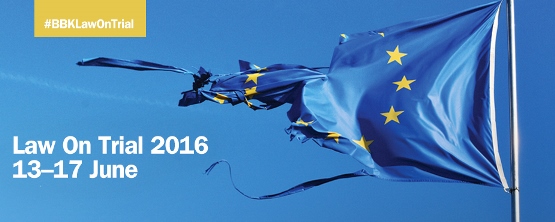This post was contributed by Michelle Everson, Professor of Law at Birkbeck. She has written widely on European Economic and Constitutional Law and has advised the European Commission, the European Parliament and the European Central Bank on matters of European Law.
Professor Everson is hosting a week long debate on ‘Europe at the Crossroads’ at Birkbeck (13-17 June). For details and to book your place, please visit the ‘European Law on Trial’ website.
Every day this week, Professor Everson writes for Birkbeck Comments, offering up her thoughts, opinions, and analysis on the EU referendum. Read part 1 and part 2 of her blog.

The crisis in economic liberalism: A common ground for the fight?
To confirm the worst suspicions of Eurosceptics, I once met Gisella Stewart, acceptable face of the Brexit campaign, on a bit of junket in Vienna. Maybe I did fly Ryanair (into Bratislava), but I admit that I was also a touch squiffy on a sparking little Zweigelt when, in the hotel lobby, she voiced to me her concerns about the democratic futures of the Union. It was the time of the European Convention and ‘Gisella’ (if I may) was a UK parliamentary delegate to conferences preparing for the birth and unveiling of a shiny Constitution for the Peoples of Europe. Being then as now of a cynical frame of mind I was more relieved than upset by the eventual failure of the European Constitution and the subsequently functionalist approach taken by the European Commission and the member states in the redrafting of the constitutional draft as the Lisbon Treaty.
On the one hand, the sight of past leaders of France and Italy, Valerie Giscard D’Estaing and Guliano Amato (betimes in their battle bus) suborning the peoples of Europe to join them in a glorious democratic future, induced in me only a vaguely Brechtian feeling of alienation. On the other, in my travels around Europe, the only committed federalists I have ever met have been members of the Federalist party (go figure), and some (but definitely not all) EU employees.
In Puglia, Carla looks to the Regione when her vines fail, in Manchester, Martha collects plates of royal weddings, in North Germany, Christian rejoices when Werder Bremen avoids relegation. The daily experience of the vast majority of people in Europe is one of political, cultural and emotional attachment to the local, regional or national level. Although the visions of a democratically-federal Europe proposed, amongst others by great minds such as Jürgen Habermas, offer an obvious and immediate solution to problems of democratic deficit within Europe, the precipitate federalisation of the prisoner’s dilemma would only de-legitimate itself. Bismarck and Garibaldi are long dead: today, the only sustainable European federalisation would be one that felt in the soul as strongly as it is born in conviction.
Nevertheless, Gisella Stewart now makes a telling point. For the left, or so she argues, the European Union is a lost cause. The majority of European governments are formed by right wing or Christian Democratic parties, the European Parliament voted to be led by Claude Juncker, not by Martin Schultz. Fazit: the left can never defeat the dominant economic rationality of the right within the Union. Now, this is all perhaps true, but vitally so, only insofar as the dominant economic rationality that now governs the EU, as it does the globe, is a natural appendage to the right. And here, returning slowly to our much-maligned German ordo-liberals, we might state that all is not as it seems, or that Gisella Stewart is wrong to dismiss the potential for revolution within EU institutions. To the contrary: She is wrong because she has yet to understand the depth of a current crisis that is not simply a crisis of capitalism, but is rather a crisis that challenges the entire political-social edifice of economic liberalism. Seen in this light, the left might yet have common cause with the right within the European Union.
In the years since financial crisis, I have found myself with some strange debating bedfellows; not just the usual cast of well-meaning Germans and culturally-exhausted Italians, but rather also chairs of global insurance companies, heads of compliance within multi-national banking corporations, Christian Democrats of many national hues, community organisers, small-scale entrepreneurs and anxiously-overburdened technocrats. Our shared ground, however, has been a desire to consign the rhetorical usage of the catch-all-hate-term ‘neo-liberalism’, to the dustbin: blindly hating capitalism, or those facets of capitalism we feel are bad does little to extricate us from economic malaise.
Contemporary crisis has its roots in very many distinct movements, not just in unbridled and unprincipled rent-seeking on the part of private actors, but also – in a term coined by the political scientist, Colin Crouch – within a ‘privatised Keynsianism’ promoted by Governments of the left and of the right across the globe, which is predicated on substitution of a putatively endless supply of self-generating private capital for the fiscally-engendered revenues of the now economically-castrated nation state; a process which still continues, albeit now subject to Central Bank oversight of private money creation within a new, but still very vaguely-defined, technocratic function of macro-prudential supervision. Neo-liberalism, when used to denote a rampant and uncontrolled state of market nature, first misses the immediate point that the systemic failure of capitalism is not only being overseen, but is also being promoted, within an exponential growth of regulatory oversight that is dedicated to the service of the chimera of efficiently-perfected competition. Secondly, however, and far more importantly it also misplaces the fatal underlying alienation of all of our dominant economic rationalities from our political and social mores.
If one thing unites the disparate strands of our dominant economic rationality, it is their social amorality, or a denuded worldview that is exhibited either in their belief that man is no more than an economic animal (homo economicus) flourishing or failing in a state of market nature in which not even God finds a place, or in their contrary reification of ‘scientifically-constructed’ and market-fostering regulation, and concomitant denial of any (Hayekian) uncertainty in the affairs of the market or of man: ‘if only we can identify the right logarithms, Capital will always beget more Capital, Amen.’
This is all so very far from a first incarnation of the term neo-liberalism in 1930s Paris as a moral response to the communist and fascist challenge then being made not simply to free markets, but also to the liberal framework of social constitution within which classical economic liberalism had always suspended them. It is also light years away from a first and enduring clarification of this defensive liberalism in the Berlin of 1938. It is a world away from the rebirth of a cornered but still battling economic liberalism by the (anti-) heroes of German ordo-liberalism who sought to secure an ordered, economic constitutionalism within the nation’s highest laws. It is a travesty of the work of academics, steeped in Lutheran tradition, such as, the economists Alexander Rüstow and Walter Eucken, the latter of whom, also bravely resisted Martin Heidegger’s determined attempts to Nazify the University of Heidelberg, as well as the lawyer, Franz Böhm.
For clarity’s sake, I am of the left, and consequently cannot but disagree with vast tracts of ordo-liberal writing. Reading this work often sends me screaming into the garden. Nonetheless, it is not the individual precepts of ordo-liberalism that are at issue here, but rather its idealised view of the economy within society, a model more recently enunciated by one last living link with the beginnings of the movement, the Hamburg Law Professor, Ernst-Joachim-Mestmäcker.
The Economic Constitution:
‘constitutes the political potency of the economic realm … but not with an eye to offering up this realm to the democratic regime; instead, it does so in order to place the democratic regime in a position from which it might disinterestedly achieve its tasks of securing justice and social welfare. The role of the Economic Constitution is not one of securing the priority of the economic realm. Instead, its role is one of enabling the exercise of independent state action in a framework of respect for the economic and political autonomy of citizens.’
In his very final lectures at the Collège de France, Michèl Foucault distinguished ordo-liberal thinkers from what he termed ‘anarcho-liberals’ (read Milton Friedman). Ordo-liberals, so he argued, had an abiding fear of social forces and hence sought to suppress all revolution and reaction by means of their pre-emption within a constraining narrative of constitutionalised freedom. And, indeed, for a radical or collectivist left, this distinction must inevitably mutate into a critique of the forces of conservatism with a small ‘c’ which would similarly deny socialist governments the full use of the political potency of the economic realm.

Professor Michelle Everson
Yet, today, in the face of socially- and politically-alienating economic rationalities that have simply forgotten, or choose to ignore the fact that the market exists within society, the painful irony of the left enjoining in a battle to overcome the crisis within economic liberalism is perhaps ameliorated. In its ordo-liberal form, the moral language of economic liberalism is one that we can recognise and engage with. Far more importantly, it is a moral language of political self-restraint which has proven itself accommodating to the demands of counter-posing forces of social tradition and of the left. The success and stability of Germany’s post war economy – and social settlement – was not the work of ordo-liberals alone, but rather the graft of ordo-liberals who fought with but similarly adapted themselves to other world views.
The reforming economic zeal of Ludwig Erhard was open to its tempering within the traditional politics of (Catholic) corporatism pursued by Germany’s first post-war Chancellor, Konrad Adenauer. In turn, the forces of social democracy, embodied by Willi Brandt and Helmut Schmidt, also shaped a now sadly-unravelling composite variety of German capitalism – a sometimes frustrating, but always democratic, culturally-rooted and socially-embedded capitalism.
Law on Trial 2016: The European Union at the Crossroads, runs at Birkbeck from Monday 13 to Friday 17 June. Book a free place here.
Listen to Professor Everson on the topic of the EU referendum in the latest edition of Birkbeck Voices
This post represents the views of the author and not those of Birkbeck
Find out more




